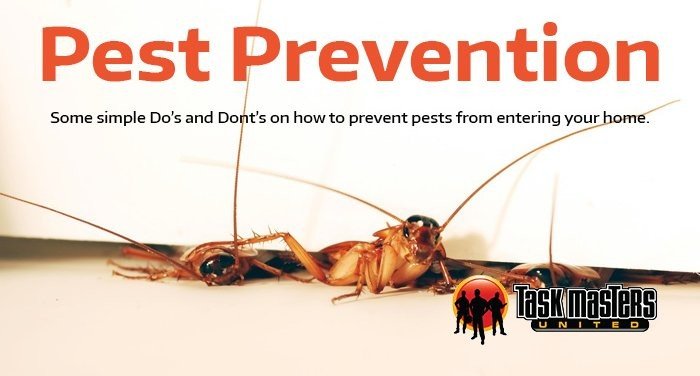Pests prevention process is very beneficial for home safety and cleanliness.Pests refers to organisms that are considered harmful and annoying,they are not desired in a particular environment or location.They can pose significant health risks and cause damage to your home. From insects,ants and cockroaches to rodents and termites, these unwanted guests can be difficult to eliminate once they’ve taken up residence.
Three Basic Steps for Pest Prevention
The best strategy is to prevent them from entering in the first place. Here are three basic pest prevention methods to keep your home pest-free and your family safe.
- Physical pest control, such as traps and barriers
- Chemical pest , such as pesticides and rodenticides
- Biological pest control, such as predatory and parasitic insects
-
Physical Pest Prevention
Physical Prevention process comprise a wide range of options. Some are common sense,such as sealing cracks and setting traps.But others are unexpected,like the way some pest control pros swear by using a vacuum cleaner.
-
Biological Pest Prevention
Biological Pest prevention method seek nature’s help to manage pests. This can be as straightforward as releasing ladybugs to eat aphids. But it can also mean reinforcing biological mechanisms already in place, such as increasing nematode numbers.Biological pest control methods get more complex, too, with microbe-based solutions engineered from bacteria.
-
Chemical Pest Prevention
Chemical pesticides are powerful against all kinds of common pests – so powerful they must be used responsibly.In that way, you get maximum effect from a minimal dose of pesticide.When considering a pesticide, start by reading the label closely.Make sure you’re confident following the instructions and application techniques.However,there are so many practical steps for eliminating pests in a better way. Some of them are discussed below.
Remove main Sources
The best approach for pests prevention is to remove sources of food, water and shelter. Store food in sealed plastic or glass containers. Garbage containing food scraps should be placed in tightly covered trash cans. Remove garbage regularly from your home.
Sealed out Entry Holes
Pests can enter your home through even the smallest cracks and holes.Check out your home for gaps around windows, doors, and utility lines. Use caulk or weather stripping to seal any openings. Install door sweeps on exterior doors.Repair or replace damaged screens on windows and vents.
Eliminate Water Collections
Pests especially mosquitoes,are attracted to standing water. Fix leaky pipes and faucets.Ensure proper drainage around your home.Regularly clean gutters and downspouts.Empty and clean birdbaths, plant saucers, and other containers that can collect water.Ensure that vents and chimney openings are properly covered with mesh.
Well maintained Breeding Space
Your garden can be a breeding ground for pests that eventually make their way into your home.Keep grass and vegetation trimmed and well-maintained.Remove debris such as leaves, branches, and woodpiles.Store firewood at least 20 feet away from your home.Trim tree branches and shrubs that touch your house.
Most friendly method
Natural pest control refers to pest control that rely on natural (chemical-free) remedies. From essential oils to fly traps to food grade Diatomaceous Earth, several natural elements can help control the pest population.These solutions are often safe for pets and small children and non-toxic.Natural repellents can help keep pests away without the use of harsh chemicals.Use essential oils like peppermint, eucalyptus, and lavender to repel insects.Plant pest-repelling plants such as basil, mint, and marigold in your garden.
Proper Inspections and Maintenance
Proper inspections can help you catch pest problems early before they become severe.Inspect your home regularly for signs of pests, such as droppings, nests, and damage.Schedule professional pest inspections annually.Address any maintenance issues promptly to prevent pest infestations.Check for any new cracks or gaps and seal them immediately.
Cover Food Storage and cleanliness
Pests are often drawn indoors by the smell of food. Proper food storage and maintaining cleanliness can make your home less appealing to them.Store dry goods in airtight containers.Keep fruits and vegetables in the refrigerator.Avoid leaving pet food out overnight.Regularly clean kitchen counters and floors to remove food crumbs.Dispose of garbage regularly and use sealed trash bins.
Best Eradicating Procedure
The most well-known way of controlling pests is by using pesticides and rodenticides. Chemical types of pest control have been seen as reliable, and tackle a large portion of the pest population. Pesticides are usually used in certain circumstances where no other method will work.
Maintain peace of mind
As a homeowner,there’s nothing more unsettling than discovering undesirable pests in your living space.From creepy crawlies to furry critters,pests can cause damage ,spread disease,and disrupt your peace of mind.By following these measurements,you’ll be well on your way to shielding your sanctuary from unwanted pests.
Conclusion
Effective pest prevention requires a combination of cleanliness, maintenance, and vigilance. By implementing these tips, you can create a hostile environment for pests and keep your home safe and healthy. Summer season should be a time for relaxation and enjoyment,not worrying about pests. By following these pest prevention tips, you can protect your home and family from unwanted invaders. If you have a persistent pest problem, consider professional pest control services.
Stay protective, stay vigilant, and enjoy your summer pest-free!









Leave a Reply